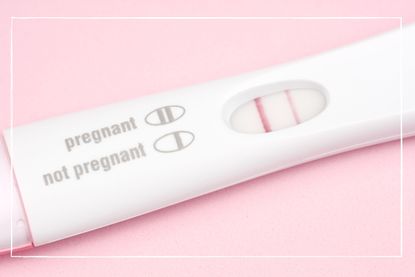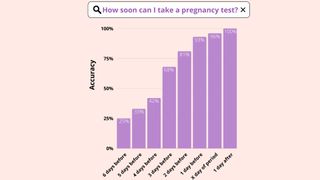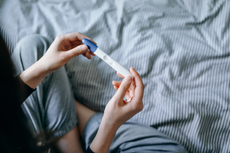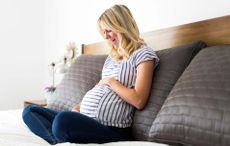How early on can you take a pregnancy test and which pregnancy test can you take the earliest?
How early on can you take a pregnancy test, and how accurate are they? All of your pregnancy test questions, answered


How early on can you take a pregnancy test is something many people wonder, especially if they're trying to conceive or they start to notice certain changes in their body.
The best way to detect pregnancy accurately is through a home pregnancy test - but many people wonder how early on can you take a pregnancy test. There are early signs of pregnancy that many people look out for when they are trying to conceive, but these are not universal and certainly don't appear in the same way for everyone.
A missed period could easily be the result of stress symptoms or a change in diet, while a stomach bug could be mistaken for morning sickness if someone hasn't been pregnant before. While feeling tired is more often than not a symptom of a hectic lifestyle rather than pregnancy.
So it's better to be safe than sorry and opt for the home pregnancy test, as it is the most reliable method. First developed in a way we recognise today in 1927, home pregnancy tests have come on leaps and bounds and are used by medical professionals around the world, along with everyday people, as they're sold everywhere from pharmacies to supermarkets.
There are some that can even detect pregnancy within the first couple of weeks, so finding the perfect one for you is also important.
That's why we've asked Dr Larisa Corda, an obstetrician, gynaecologist and one of the UK’s leading fertility specialists, to help us out.
How early on can you take a pregnancy test?
You can take a pregnancy test from the first day of a missed period. And, though you may not want to wait, the best way to be sure is give it at least a week after your period is due.
Some home pregnancy tests may claim that they can tell if you're pregnant on the day you expect your period and it's possible to tell even a couple of days before your period, but this is not usually the case. It's not always possible to be that specific about the date of your period, and levels of hCG - a hormone produced by the placenta - vary greatly from woman to woman.
Women all have different menstrual cycles and so everyone ovulates at a different time. This will affect when your period is due. You may also have conceived later in your cycle than average, which will affect how much hCG is in your body.
How soon after unprotected sex can I test for pregnancy?
If you’re actively trying to conceive and you don’t want to wait until you’ve missed your period, you should wait at least one to two weeks after you had sex as some very sensitive tests may be able to detect a pregnancy at this stage.
If you’ve missed a period, regardless of whether or not you’re using the best type of contraception for you, it’s a good idea to do a pregnancy test to check.

Which pregnancy test can you take the earliest?
All pregnancy tests are most reliable on the first day of your missed period, according to the NHS, but some tests can be used as early as 4 or 5 days before your period is even due. These include...
Clear Blue Early Detection Pregnancy Test
One of the most reliable brands for pregnancy tests, this Clear Blue test is 79% accurate in testing for pregnancy 6 days before the missed period and 5 days before the expected period. It's got a classic colour changing tip for easy to read results and currently, you can get one test for just under £6 on Amazon.
First Response Early Pregnancy Test
With this pregnancy test, you can find out whether you're pregnant 6 days before your missed period and 5 days before your period is expected. Watch out though because it's slightly less effective at predicting early pregnancy than the Clear Blue test at 62% effective 6 days before, but it is 99% effective on the day of the missed period. Get 2 tests for under £6 on Amazon.
Clear Blue Digital Pregnancy Test
This pregnancy test is 99% accurate from the day of your expected period but can be used 4 days before the expected period, so it's the normal pregnancy test you can take the earliest.
Clear Blue was a brand recommended by over 400 doctors in a 2012 survey and at the moment, you can buy two tests for £11 from Amazon.
Pregnancy tests: Early signs you may need to take a pregnancy test
A missed period
One of the first and most reliable signs of pregnancy is a missed period in a woman who has regular periods. However, your period can sometimes be delayed or skipped due to stress, diet, exercise, or certain medical conditions.
Women all have different menstrual cycles and so everyone ovulates at a different time. This will affect when your period is due. You may also have conceived later in your cycle than average, if ovulation has been affected by something, even lifestyle. Although you may not want to wait, the best way to be sure is give it at least a week after your period is due.
Mild cramps
Implantation can also produce a feeling similar to menstrual cramps, except you won’t get a period associated with it. This can be an indication you’re pregnant.
Breast tenderness
Due to the increased production of oestrogen and progesterone, your breasts may feel tender and appear bigger due to increased blood flow. Your nipples might hurt and the veins might look darker under the skin.
You feel unwell
You may get nausea, food aversions, exhaustion and find yourself going to the toilet often to urinate. You know yourself, so pay attention to your body and any unusual physical symptoms that could mean you are pregnant.
How do you do a home pregnancy test?
There are many different types of home pregnancy tests and they cost between £6-12. Most of them work by telling you to urinate onto a small stick.
There are different ways to collect your urine for the test. Depending on the test you choose, you may have to:
- Collect your urine in a cup and dip a testing stick into the liquid
- Collect your urine in a cup and use an eyedropper to move a small amount of fluid into a special container
- Place the testing stick into the area of your expected urine stream so that it will catch your urine midstream
After the recommended waiting time has passed, the tests will display your results either as a change in colour, a line, a symbol, such as plus or minus, or the words 'pregnant' or 'not pregnant'.
If a line or plus symbol appears, you are pregnant. It doesn’t matter how faint the line or plus symbol is, the result is positive.
Most brands will advise you to repeat the test in a few days, no matter what the result.
If your first result is negative, it doesn’t mean you’re not pregnant. There might not be enough hCG in your body yet – take it again in a few days.If your first result is positive, you’re almost definitely pregnant. False positives are very rare, although they do sometimes happen, especially if you are on certain medication.
How accurate are home pregnancy tests?
Home pregnancy tests are very accurate and most claim between 97 per cent and 99 per cent accuracy, but as with any kit there are things that can affect the test result.
Here are some tips for how to improve their accuracy:
- Check the expiry date and make sure you follow the instructions properly.
- The amount of hCG or pregnancy hormone in your urine increases with time and is often different at certain times of day. The earlier after a missed period you take the test, the harder it is to spot the hCG. Also, testing your urine first thing in the morning may boost the accuracy.
- The amount of hCG in urine is different for every woman. Some women will have accurate results on the day of the missed period while others will need to wait longer.
- Some tests are more sensitive than others, and will affect how early you can use them to detect pregnancy.
If in doubt, the best thing to do is to consult your GP or a health care professional who will be able to take a pregnancy test for you.
How do pregnancy tests work?
Pregnancy tests look for a special hormone in the urine or blood called hCG (human chorionic gonadotropin) that is only there when a woman is pregnant.
HCG is only made in your body after a fertilised egg implants itself in the uterus and this usually happens around 6 days after conception. However, this can vary from woman to woman but the further along your pregnancy you are, the higher the level of hCG tends to be in your body.
You might also like:
Early signs of pregnancy: 23 symptoms to be aware of
How to in increase fertility: 42 ways to boost fertility
What's normal on your period: everything you need to know
Morning sickness: the causes, symptoms and best home remedies
Goodto Newsletter
Parenting advice, hot topics, best buys and family finance tips delivered straight to your inbox.

Dr Larisa Corda is an obstetrician and gynaecologist and one of the UK’s leading fertility specialists. She qualified from Imperial College London with her training taking place in both the UK and Australia. This has seen her gain an understanding and appreciation of gynaecological, obstetric and fertility issues across a wide international population. Larisa believes in a holistic approach to treating a patient that addresses many lifestyle factors as well as a combination of Eastern and Western medical approaches. Larisa is ITV This Morning’s and Channel Mum’s Fertility Expert, where she can regularly be seen on screen sharing her expert advice.
-
 Cheapest places for your Christmas dinner staples revealed in new research, but where does your usual supermarket rank on the list?
Cheapest places for your Christmas dinner staples revealed in new research, but where does your usual supermarket rank on the list?New research has ranked the nation's favourite supermarkets from cheapest to most expensive for Christmas dinner essentials
By Sarah Handley Published
-
 "I appreciate your opinion, but you've got to calm down" Beyoncé's gentle parenting technique has gone viral and the internet is loving it
"I appreciate your opinion, but you've got to calm down" Beyoncé's gentle parenting technique has gone viral and the internet is loving itA clip from Beyoncé's new Renaissance film shows her engage in gentle parenting after a debate with Blue Ivy over the tour setlist - and the internet loves her for it.
By Lucy Wigley Published
-
 Fertility foods: 21 of the best foods for getting pregnant, according to a nutritionist
Fertility foods: 21 of the best foods for getting pregnant, according to a nutritionistMaking sure your diet is packed full of fertility food can improve your chances of getting pregnant. Here’s some of the best foods to eat
By Emily-Ann Elliott Last updated
-
 Superfetation twins: Can I get pregnant when I’m pregnant?
Superfetation twins: Can I get pregnant when I’m pregnant?By Tannice Hemming Published
-
 Gender selection: how to conceive a boy or a girl
Gender selection: how to conceive a boy or a girlEverything you need to now about conceiving a boy or a girl...
By Tannice Hemming Published
-
 Why can't I get pregnant? 10 possible reasons you're struggling to conceive
Why can't I get pregnant? 10 possible reasons you're struggling to conceiveIf you've been trying for a while but haven't had any success yet, read these 10 possible reasons you've having problems getting pregnant.
By Debra Waters Last updated
-
 I want a baby and they don't: what to do when your partner's not ready to take the next step
I want a baby and they don't: what to do when your partner's not ready to take the next stepWanting a baby when your partner doesn't is a far more common problem than you might think
By Grace Walsh Published
-
 When to get pregnant: the best time of year for a baby
When to get pregnant: the best time of year for a babyDid you know the season your child is born in can affect its health, as well as making a big impact on you and your health too?
By Jessica Dady Published
-
 What is ovulation? Everything you need to know about ovulation
What is ovulation? Everything you need to know about ovulationGetting pregnant should be easy, but it isn't always. So, read all about ovulation here, find out when you're most fertile and try our ovulation date calculator
By Dr Larisa Corda Last updated
-
 How to get pregnant: 8 expert tips from fertility expert Larisa Corda
How to get pregnant: 8 expert tips from fertility expert Larisa CordaWondering how to get pregnant or are in the midst of trying? This Morning's fertility expert Dr Larisa Corda shares her top tips for boosting your chances of conceiving.
By Dr Larisa Corda Last updated